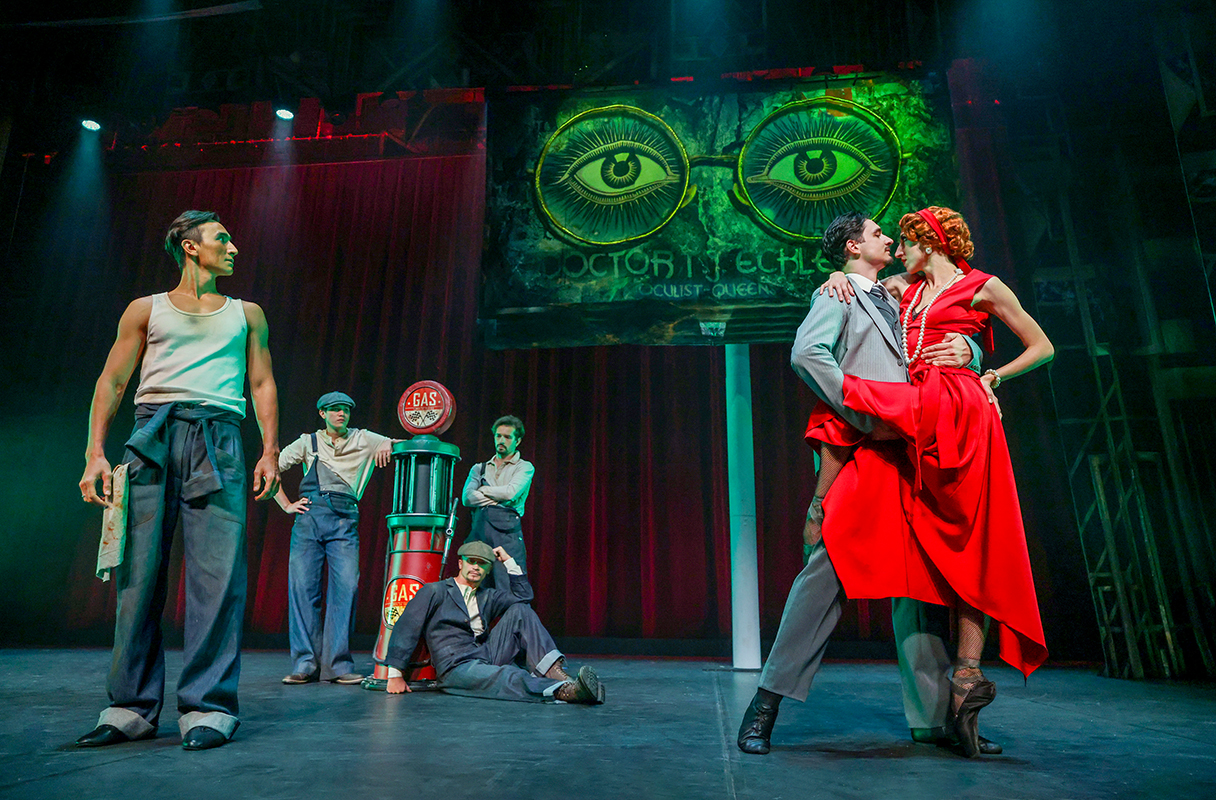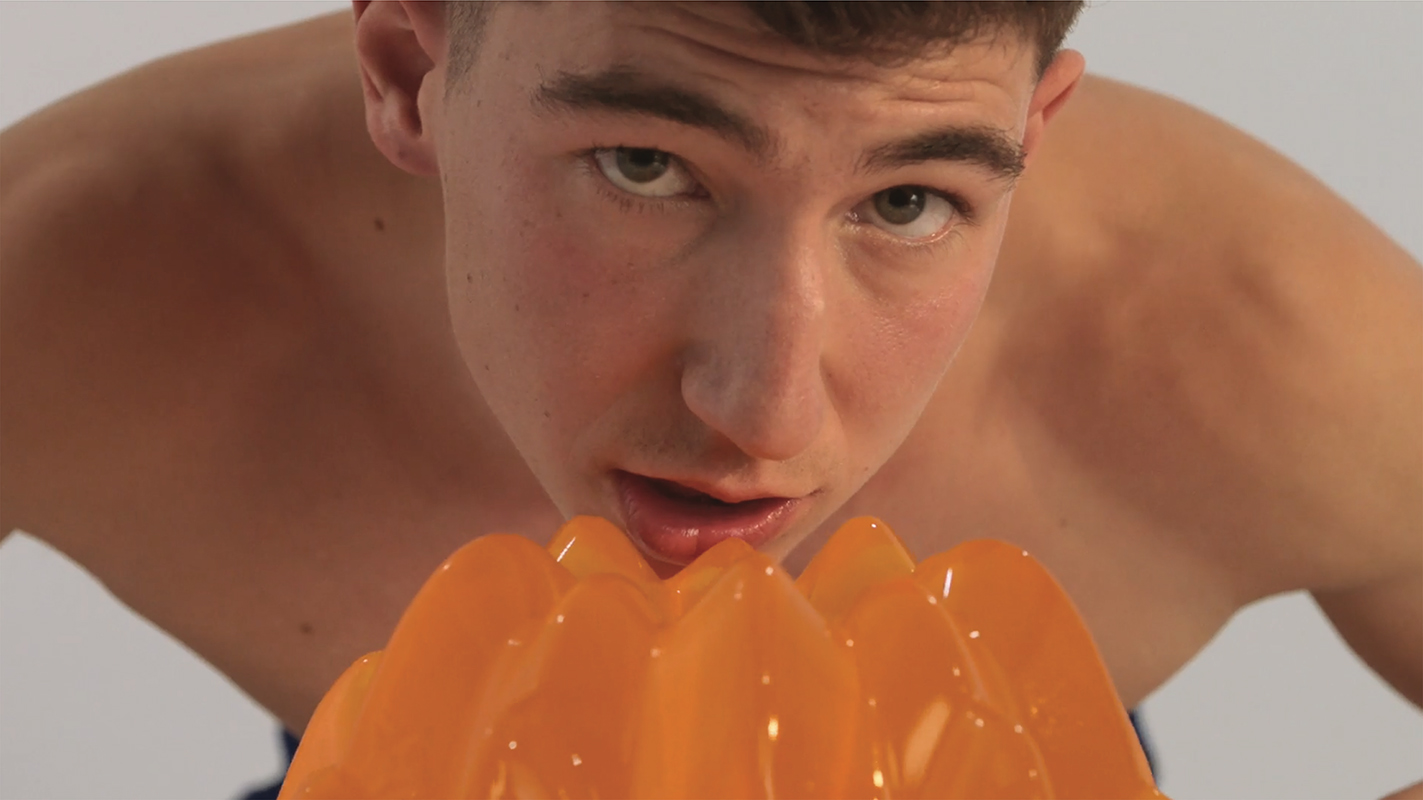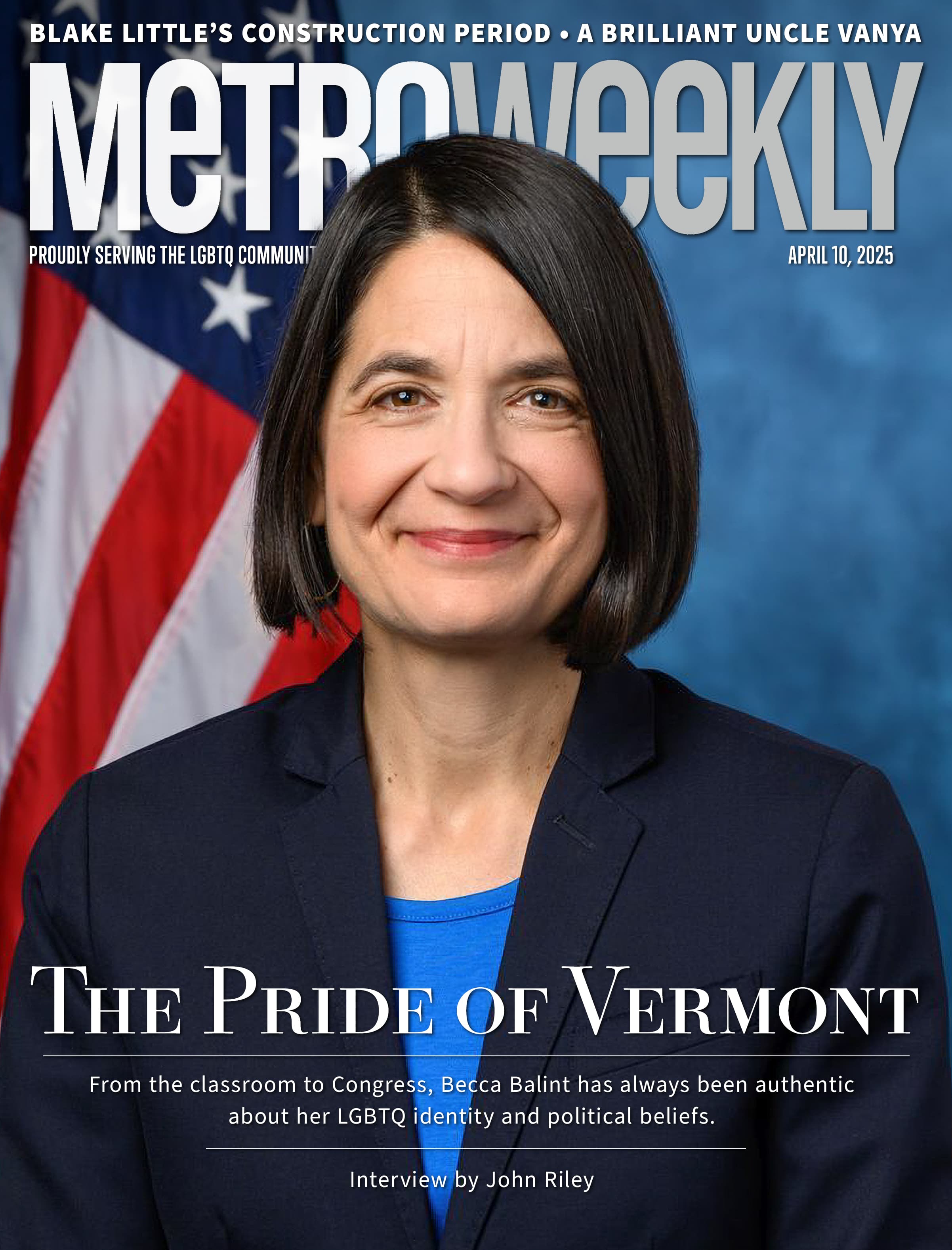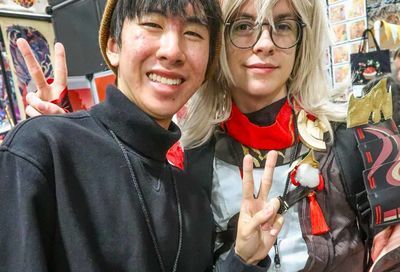Guiding the Arts: Douglas Yeuell is making the Atlas Performing Arts Center a cultural destination
Douglas Yeuell on the Atlas Intersections Festival, his time at Joy of Motion, and what the arts have brought to his own life

Douglas Yeuell has had enough of sticking to the sidelines and staying out of the political fray.
“Boy, has that changed! I’m fired up!” says the executive director of the Atlas Performing Arts Center. Yeuell is determined to stand up for what’s right, speak out against what’s wrong, and most notably make use of his organization’s platform to galvanize others to join the #Resistance.
Among other things, he’s sick and tired of those — in the Trump Administration and elsewhere — who continually, reflexively discount or dismiss the power and value of art. “As a dancer and as a dance teacher having taught literally thousands of people over the course of many, many years, the type of positive feedback I got for what I did or what others did just taught me over and over again that art matters, art makes a difference, and to that degree, it is a great value,” says the 57-year-old former head of the Joy of Motion Dance Center.
“Art is what connects us to what it means to be human, and connects us to our humanity,” he continues. “In today’s society and culture and world, it’s that humanity that we keep losing and we keep not connecting to, dividing us and making us indifferent or hostile to each other.”
Making connections through art is the whole point of the ninth annual Atlas Intersections, the complex’s marquee event. “Initially when the festival began in 2010, there was a real push for it to be an event that brought people to the Atlas and to H Street,” Yeuell says. Now that the area is busy on a regular basis, the goal is to attract even more people, more often. This year’s Intersections marks the fifth since Yeuell took the Atlas helm, and it’s intended to encourage more collaboration across genres, as well as more interactions across the board, among performers and audiences.
“The Intersections Festival is an arts festival that presents close to 100 performances and 800 artists over a multi-weekend format,” Yeuell says. “And not just performing arts — we integrated visual arts and culinary arts, too.” Among this year’s LGBTQ performers, there’s Shawn Short and his Dissonance Dance Theatre with Lenny B: An Evening of Leonard Bernstein (Saturday, Feb. 24). “Short always does just phenomenal work and has got such a passion and great insight — somebody not to be missed,” Yeuell says. Other notable shows: A free concert by local black, lesbian, folk/rock act Crys Matthews (Friday, Feb. 23), a performance by the Gay Men’s Chorus’ GenOut ensemble during the Youth Summit (Saturday, March 10), a book-signing with young adult LGBTQ author Robin Talley (Friday, March 2), and two new circus/aerial arts groups, Alter Circus (Sunday, Feb. 25), and Street Light Circus (Saturday, March 3).
Taking time out of a busy weekday afternoon, Yeuell discusses and reflects on the center, the festival, his life in D.C., and career in the arts. Repeatedly over the course of almost two hours, he returns to the same central theme: “Art matters — art educates us, it informs us, it inspires us, it enlightens us, it transforms us, it entertains us. It can do many, many, many things. Art really does have a great power and certainly there just continues to be a great need for art.”
METRO WEEKLY: How long have you been associated with the Atlas Performing Arts Center?
DOUGLAS YEUELL: I was a part of the original team of people who were involved in creating the Atlas, as the executive director of Joy of Motion Dance Center, which was its first resident arts partner. The dance studios were the first things built — they built out the Atlas in phases. Joy of Motion opened in 2005, and then the remainder of the center opened in 2006. Joy of Motion’s main offices are also here at the Atlas, within the lower level. So I’ve always been connected to and involved with the Atlas in various and sundry different ways. I became executive director in 2014.
MW: The Atlas was built as a movie theater. What of that history still remains?
YEUELL: The Atlas Movie Theater was built in 1938 and served the community until H Street became the epicenter of the riots of ’68, after the assassination of Dr. Martin Luther King. The Atlas stayed in business for a few years after that, but then closed its doors and sat empty for about 35 years. In the early 2000s, philanthropists Jane Lang and Paul Sprenger had a vision that ultimately grew into building a performing arts center together with the D.C. government. Interestingly enough, everything outside — the façade, marquee, and exterior walls — is original, but pretty much everything inside is new construction. It was reborn through a massive renovation and turned into a performing arts center that has four performance venues — two small lab theater spaces, a larger black box theater space, the Sprenger Theatre, and then our main space, which is the Lang Theatre proscenium stage, in addition to the dance studios and a whole administrative office complex below.
I want to share a story that stuck with me the first fall that I was here leading the Atlas, during the H Street Festival. I was out on the street, and this little old man came up and said, “Is this the Atlas Theater?” I said, “Well yes it is.” And he goes, “Oh my goodness, I cannot believe it’s still here. Can I go inside?” He hadn’t been back in the District in 40 years. He came back for a family reunion, and it happened to take place that day, and he wanted to walk the old neighborhood. I took him up to the Lang Theatre, which is where the movie theater was originally, and he got real emotional. He started to cry. “I wish, I wish, I wish my father could see this. I was a school teacher for D.C. public schools, a coach, lived here for many years.” He stood there, and with tears in his eyes, said, “Thank you for making me feel young again” — by revisiting old memories of great, sentimental importance to him and of his father.
What that told me is that there are so many people that have such fond and great memories of the Atlas, and that’s something to be mindful of and that’s something to honor. But as well as honoring and being mindful of our past, certainly we should also be looking to see what the future will bring. And how can we as an organization create those new memories that people will remember 50 years from now. That to me is what I hope to see us creating and achieving as we move forward in this organization.
I’d love for the Atlas to be a place where, yes, you come to see a show, but you leave changed in some way because of what you’ve experienced, what you’ve learned, what you’ve been inspired to do, what you have been informed on and educated with, all of those things. For this to be a life-changing experience, a memory-making experience.

MW: Where did you develop your passion for the arts?
YEUELL: At the University of Virginia. I was a language major. I did Russian studies by day, and by night, I was doing performing arts — musical theater, dancing, singing, the whole nine yards. That was a passion of mine. However, there was a practical side of me going, “Oh my god, I have to make a living, I have to do something else, I can’t be in theater, and I can’t be in drama because it’s such a rough and tough life.” So I graduated with my Russian studies degree from UVA, with the thought I can get a job working for the government.
Instead, when I started living in D.C. after college, I was teaching dance, I was choreographing dance, doing things professionally. And then I did what we call gig out — dancing with different companies and different groups, and performing here, there, and everywhere. I just did that for years. Then I started doing dance administration. And then I had my own dance company for a while. I used to teach god knows how many dance classes each week at Joy of Motion, and I dropped it down eventually to one class, and then I was running Joy of Motion full-time.
MW: When did you realize you were gay?
YEUELL: I’m a good southern boy. I grew up having no idea what gay was. I was clueless. I went through high school, all I knew is that girls were my best friends, but I never went out on dates with girls. And it’s just, I don’t know, I never thought about it because they’re all my friends. College is where I had my first experience. I went, “Oh, oh, oh, this is so natural. Oh my god, I must be gay.”
MW: How was coming out to your family?
YEUELL: My coming out story is actually a pleasant one. A couple of years into our relationship, [my partner] Hugo and I had some argument, some fight, and we were on the fritz, and I was just so devastated. And I remember talking to my parents on the phone, and of course mother knows best. She asked, “Well what’s wrong, what’s wrong, what’s wrong?” It’s hard talking to parents about sexual things anyway, but I’d never had this conversation with them before at all. My mother kept going “What’s wrong?” And then she got my father on the phone. So finally, I said, “Well, mom and dad, I’m gay.” And my dad said, “Well, I knew that, but what’s wrong?” I was blown away. They were quite lovely, and I’ve always been very supported by my parents. So it was nothing traumatic, but certainly always it’s a challenge to be able to say those words, and I had a hard time saying them.
MW: Were you raised in a religious background?
YEUELL: My father is a retired Presbyterian minister, so yes, it was.
MW: And it wasn’t a hurdle to coming out?
YEUELL: It wasn’t. I was a preacher’s kid — but my dad was, and still is, probably more liberal than I am. He was the type of guy in the ’60s and ’70s that wore sandals, had a beard, and did macramé. He was a hip dude, and very liberal in his ways of thinking.
MW: And what about Hugo — how did you meet?
YEUELL: It was 1985 and I was 24 when I met the love of my life, here in Washington at the former Lost & Found — I don’t know if people remember that club.
In the ’80s, I did retail management, and I worked for the former department store Woodward & Lothrop. Hugo worked at Woody’s and in housekeeping. At the Lost & Found one night, I’m wearing my little torn shorts and my torn t-shirt, because this is the Flashdance era. So I had my boots, and my hair was all done up. There’s this huge crowd, and you’re squishing your way through, and Hugo walks right by me. I was there with a couple of friends from Woody’s, and they knew him from Woody’s. So then we’re all dancing on the floor and everything, and that’s when I first met him, and over time we’d date and do stuff and progress.
MW: How many years have you been together?
YEUELL: 33.
MW: Congratulations! What’s the secret?
YEUELL: One thing is, there were many times when we were apart. For many years, he worked evenings, Monday through Friday. And I would work Monday through Friday daytime, and then on the weekends is just when it all happens. So we were ships in the night in many ways. And he also has a place in Centreville, and a family out there, his mother. So he’d be out there a lot, I’d be here and it was just fine because we both had a lot going on. We’ve really lived that way for 33 years. In the end it’s about having space. Absence makes the heart grow fonder, so every week when we connect on date night, it’s like I’m meeting him for the very first time, and I’m just so deeply in love. So I guess that’s the secret — that we’re apart a lot. But when we get back together, it’s like getting back together for the very first time. That kind of keeps it fresh and keeps you always looking forward to it.
MW: Do you always go to the same place for date night?
YEUELL: We’re creatures of habit at this point. There’s one or two restaurants that we’ll go to when we go out to eat someplace — we have a Mexican restaurant that we go to all the time and a Peruvian restaurant in the hood out in Virginia that we’ll go to. It’s just kind of our little thing that we do. And then the weekend comes, and if I’m not here for a show or doing something then we just get to hang out and watch television. Or we’ll go shopping. In the warmer months I get to do yard work, I get to mow the lawn. We moved out there and had to get a lawnmower: “Oh, how do I do a lawnmower? Oh my god, it’s a power tool, I don’t know what to do with it.” But I’m actually pretty good with power tools and lawnmowers. I can kind of do that stuff now. We just have simple date nights and simple time together. Really, the relationship is just sort of the wind beneath one’s wings, because you come together after all this life on a weekly basis. Just to have time to share and experience each other is precious.

MW: I don’t know if it was intentional, but you’ve paraphrased Bette Midler’s biggest hit.
YEUELL: Oh my god, I did! When she sang that in Beaches, it ripped me up. It still rips me up. But yeah, that song is very poetic, and it really makes a lot of sense to me. We have special people in our lives that represent that, and it’s just a great image. I use it all the time, that phrase. I think it’s what we all need. We need people who can support us to get us through all of everything that we do.
MW: Do you work directly in dance anymore or did you end that when you left Joy of Motion?
YEUELL: I really don’t. In the spring of 2014 I got really sick. I had some physical issues that really came to the forefront, and I actually had to stop cold turkey. It had to do with my neck — I had a dissected carotid artery. I had this horrible headache and it just didn’t go away for months. Somehow, I injured my carotid artery and it had sprung a leak. I couldn’t even move my head. It was very traumatic.
I remember getting sick, I guess end of February. I had such a bad headache, I went to the doctor. They couldn’t figure out what was wrong with me. I go to have an MRI, and I remember I’m walking out of the MRI Center, and the doctor comes running after me from the back of the place and says, “Stop! Come back here. We’ve found something on your MRI,” and he showed it to me. He says, “I need you to go to the closest Emergency Room.” I said, “What?!”
MW: That sounds alarming, but it also must have been a relief that they found something?
YEUELL: Right, you kind of have that weird feeling. So I got in my car and I drove to Alexandria Hospital, and went to the Emergency Room and they admitted me right away. As I grew to understand, there’s a potential that blood could leak and go to your brain — I was a stroke candidate. I was in the hospital for a couple of days. I got a little bit better, then my headache would come back. It took about three months for it to all kind of work it’s way out.
Interestingly, during that time is when I got the call about the Atlas. It’s just interesting how the universe works. I was worried: What am I gonna do? First of all my head hurt so badly, it was like I can’t do anything. And then this opportunity came up.
MW: How much time passed in between when you were ill and when Atlas came calling?
YEUELL: I was literally in the hospital hooked up to IVs and all that stuff, and I get a phone call from Jane Lang, the founder of the Atlas. I don’t really remember her exact words, but something to the effect of, “We’re looking to do some changes here at the Atlas and was wondering if you’d be interested in becoming the executive director?” I said, “Can I call you back? I’m in the hospital right now.” “But of course! But of course, but of course.” Jane is a formidable individual, and persistent, so she called me back. It took a while. Starting about March of 2014, we did a special arrangement with Joy of Motion. Ultimately I made the switch and became the full-time executive director of the Atlas on Aug. 1, 2014.
MW: At that point in time, Atlas was struggling a bit more than it is now.
YEUELL: Yeah. I mean all non-profit arts organizations have just got such stories to tell. Things are different now, and there have been lots of changes across the board. Hopefully I have made a positive impact as far as that’s concerned, but it takes a village, and it takes many people to make those changes happen, and we do have a really dedicated crew of hardworking people that really are passionate about the success of the Atlas, and passionate about what we do, and that helps make a big difference.
There’s a lot of great stuff happening here, and it’s just exciting to be a part of that experience, and a part of that growth. Sometimes you think that the Atlas would have it all figured out by now, but it’s still a very new organization and there’s just still a lot to discover, and a lot to know and a lot to grow on. This community, it is so dynamic, it just changes every day. Being able to stay in sync with that is a challenge.
MW: And I’m sure you still get a lot of patrons who haven’t been to the Atlas before?
YEUELL: Absolutely. When we give welcome speeches before shows, one of the things we ask is, “How many people are here for the first time?” And it is a significant number of people. Which to me is just a really great thing, because it means that there’s that many more people to engage and ultimately retain — keep them coming back.
MW: Mosaic Theater Company also started here under your tenure.
YEUELL: Mosaic came on board right when I came on board in 2014, then launched their first season in 2015. Mosaic is a very strong resident arts partner of the Atlas, and the work that they do is compelling and certainly also fits right into the mission of the Atlas and what we’re about and what we try to do from a programmatic perspective.
MW: They’re also bringing in new people, theatergoers who had never previously set foot in the Atlas.
YEUELL: Oh, they’re bringing in a bunch of people. Mosaic has made a huge difference as far as audiences coming to the Atlas and marketing the Atlas.
One of the things I did when I came on board, I put myself and the Atlas to the test of what does capacity look like. We have these four performance venues — how much can we really do at once here? Because a lot of nights were dark, and a lot of spaces were dark on a very extended basis. That is not energetic, and that does not help us build what I call critical mass, which starts to feed off of itself. It was definitely a concentrated effort on my part to program and schedule and really test the capacity of the building and certainly of staff. But also the capacity of what we were doing from a programmatic perspective to really also make sure that we’re offering a great variety of things. It’s taken us to the next level. I think there’s that much more that’s happening here at the Atlas on a much more regular basis than there was before.
The Atlas Intersections Festival 2018 kicks off with a Launch Party on Thursday, Feb. 22, from 7 to 8:30 p.m. The festival runs weekends to March 11, at the Atlas Performing Arts Center, 1333 H St. NE. Ticket prices and passes vary. Call 202-399-7993 or visit atlasarts.org/intersections for a full schedule of events.
Support Metro Weekly’s Journalism
These are challenging times for news organizations. And yet it’s crucial we stay active and provide vital resources and information to both our local readers and the world. So won’t you please take a moment and consider supporting Metro Weekly with a membership? For as little as $5 a month, you can help ensure Metro Weekly magazine and MetroWeekly.com remain free, viable resources as we provide the best, most diverse, culturally-resonant LGBTQ coverage in both the D.C. region and around the world. Memberships come with exclusive perks and discounts, your own personal digital delivery of each week’s magazine (and an archive), access to our Member's Lounge when it launches this fall, and exclusive members-only items like Metro Weekly Membership Mugs and Tote Bags! Check out all our membership levels here and please join us today!
























You must be logged in to post a comment.